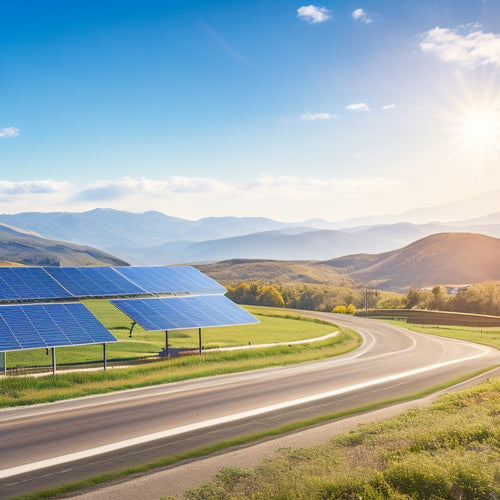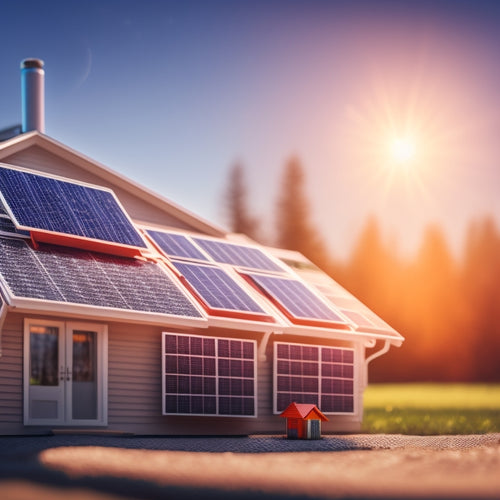
Components of Home Solar Panel Systems
Share
Home solar panel systems consist of several key components vital for performance and efficiency. You'll need solar panels customized to your energy needs, typically monocrystalline for high efficiency or polycrystalline for budget-friendly options. Inverters convert solar energy into usable electricity, with choices like string inverters or microinverters available. Battery systems enhance energy independence by storing excess power. Proper installation is essential for maximizing your system's effectiveness, often supported by warranties up to 25 years. By understanding these components, you can make informed decisions that lead to significant savings and a reduced carbon footprint, and you'll uncover even more benefits as you investigate further.
At a Glance
- Solar panels convert sunlight into electricity, with types including monocrystalline, polycrystalline, and thin film, each serving different efficiency and cost needs.
- Inverters are essential for converting generated solar energy into usable electricity for homes, with options like string inverters and microinverters based on efficiency requirements.
- Solar battery systems store excess energy for later use, enhancing energy independence and providing backup power during outages.
- Performance monitoring tools help track energy production, ensuring the solar panel system operates at peak efficiency.
- Proper installation is crucial for maximizing system efficiency and longevity, often supported by warranties of up to 25 years.
Cost-Effective Energy Solution
Investing in solar panels can lead to significant long-term savings on your energy bills, making it a smart financial choice.
By adopting renewable energy solutions, homeowners can reduce their carbon footprint while benefiting from lower energy costs, as solar energy is generated at a lower cost compared to traditional fossil fuels. This allows you to save up to $500 annually on electricity bills (financial benefits of solar energy).
Plus, you can take advantage of various government incentives that help offset the initial costs, enhancing your return on investment.
Long-term Savings Potential
Home solar panel systems present an appealing opportunity for homeowners looking to reduce energy costs over time. By utilizing the sun's energy, you're not just investing in technology; you're securing your financial future.
With the right maintenance strategies, such as regular inspections and cleaning, you can guarantee your system operates at peak efficiency, maximizing your savings.
Financing options make solar panel systems even more accessible. Many providers offer flexible payment plans, allowing you to install a system without a hefty upfront cost.
By financing your system, you can start saving on your energy bills immediately, turning what was once an expense into a long-term asset.
As electricity prices continue to rise, the savings potential of solar energy becomes increasingly significant. You'll enjoy greater control over your energy costs, reducing your reliance on utility companies.
Additionally, you'll contribute to a sustainable future, aligning your values with your financial decisions.
Ultimately, investing in solar panels is a strategic move that enables you to take charge of your energy consumption, all while enjoying the freedom of lower utility costs for years to come.
Government Incentives Available
Alongside the long-term savings potential of solar panel systems, government incentives greatly enhance their affordability and appeal. By taking advantage of these financial benefits, you can markedly lower your initial investment and achieve energy independence more quickly.
One of the most impactful options available to you is federal tax credits. Currently, you can claim a percentage of your solar installation costs on your federal tax return, making it a powerful tool for reducing your upfront expenses. This incentive is designed to encourage more homeowners to adopt renewable energy, so don't miss out on this opportunity.
In addition to federal support, many states offer their own rebates and incentives. These state rebates can vary widely, so it's important to research what your local government has to offer. By combining both federal tax credits and state rebates, you could see a substantial decrease in the overall cost of your solar panel system.
Harnessing these incentives not only makes solar energy more accessible but also aligns with your desire for freedom from rising energy costs.
Seize this opportunity to invest in a sustainable future while enjoying financial benefits.
Environmental Impact Reduction
Installing home solar panel systems greatly decreases your carbon footprint by utilizing clean, renewable energy.
By generating electricity from sunlight, you reduce reliance on fossil fuels, which contributes to a healthier environment.
Solar energy decreases reliance on fossil fuels and greenhouse gas emissions, further improving the positive impact on our planet.
Embracing solar energy not only benefits you financially but also plays an essential role in combating climate change.
Decreased Carbon Footprint
Utilizing solar panel systems considerably reduces your carbon footprint, contributing to a greener planet. By capturing the power of the sun, you're making eco-friendly choices that minimize greenhouse gas emissions. Traditional energy sources like coal and natural gas release significant carbon dioxide when burned, which contributes to climate change. In contrast, solar energy is clean and renewable, producing no harmful emissions during operation.
Integrating solar panels into your home is an essential step in adopting sustainability practices. Every kilowatt-hour of solar energy you produce not only powers your home but also offsets the reliance on fossil fuels. This shift encourages a cleaner environment and promotes energy independence, allowing you to break free from fluctuating energy prices and grid dependency.
Moreover, the more households that adopt solar technology, the greater the collective impact on reducing carbon emissions in your community. You're not just benefiting your home; you're contributing to a larger movement towards sustainable living.
Choosing solar power is an enabling decision that aligns with your values of freedom and responsibility toward the planet. Make the switch today and take satisfaction in knowing you're part of the solution for a sustainable future.
Renewable Energy Benefits
Adopting solar panel systems not only reduces your carbon footprint but also enhances the broader benefits of renewable energy, particularly regarding environmental impact reduction. By utilizing sunlight, you contribute to energy independence, allowing you to generate your own power and lessen reliance on fossil fuels. This shift encourages a cleaner environment, promoting both air and water quality.
Furthermore, solar energy improves grid resilience. It helps stabilize the grid during peak demand and minimizes the risk of outages. You're not just supporting a sustainable future for yourself; you're contributing to a strong energy infrastructure.
Here's a quick comparison of the environmental benefits of solar energy:
| Benefit | Description | Impact on You |
|---|---|---|
| Carbon Emission Reduction | Lowers greenhouse gases | Cleaner air, healthier life |
| Energy Independence | Reduces reliance on fossil fuels | More control over energy costs |
| Grid Resilience | Strengthens energy supply stability | Fewer outages, reliable access |
Key System Components Overview
In understanding home solar panel systems, it's essential to know the key components that drive their efficiency.
You'll encounter various types of solar panels, each designed for specific needs, along with inverters that play an important role in converting solar energy into usable electricity.
Additionally, integrating a solar battery system can enhance energy independence and provide backup power during outages, making it an integral component of modern solar solutions.
Grasping these elements will enable you to make informed decisions about your solar investment and take advantage of the benefits of solar energy storage.
Solar Panels Types
When exploring home solar panel systems, understanding the different types of solar panels is essential for making an informed choice.
You'll typically encounter monocrystalline panels, known for their high solar panel efficiency and sleek appearance. They're perfect if aesthetics matter to you and you want to maximize energy production in limited space.
On the other hand, polycrystalline panels are often more budget-friendly, though slightly less efficient. Thin film technology offers flexibility and lightweight options, making them ideal for unconventional installations.
Consider BIPV systems if you're looking to integrate solar directly into your building materials, blending functionality with design.
Each type has specific installation considerations and maintenance requirements; for instance, monocrystalline panels generally require less upkeep. Warranty options also vary, with some manufacturers offering guarantees up to 25 years, which can enhance your peace of mind.
Lastly, performance monitoring tools can help you track energy production, ensuring you get the most out of your investment.
Inverter Functionality Explained
Choosing the right solar panels is just the beginning of creating an effective home solar panel system; understanding inverter functionality is equally important.
The inverter is the heart of your solar setup, converting the direct current (DC) generated by your panels into alternating current (AC) that powers your home.
There are several inverter types to evaluate, including string inverters, microinverters, and power optimizers, each with distinct advantages.
String inverters are typically more cost-effective for larger systems, while microinverters offer improved efficiency and performance for individual panels, especially in shaded areas.
Inverter efficiency plays a vital role in maximizing the energy you capture from the sun.
A high-efficiency inverter can greatly reduce energy losses, ensuring you get the most out of your investment.
Look for models with efficiency ratings above 95% to optimize your system's performance.
Selecting Based on Energy Needs
To select the right solar panel system, you'll first need to assess your current energy consumption.
Understanding how much energy you use now and projecting future needs will help you determine the size and capacity of the system that best suits your household.
Conducting a thorough energy audit can reveal inefficiencies and peak usage times, which is essential for maximizing efficiency and ensuring your investment meets your long-term energy goals.
This process won't only optimize your system but also highlight potential energy needs assessment advantages that can lead to significant savings.
Assessing Energy Consumption
Evaluating your energy consumption is essential for selecting the right home solar panel system that meets your specific needs.
Start by conducting an energy audit, which will help you understand your current usage and identify any inefficiencies. An energy audit provides a clear overview of your consumption patterns, allowing you to pinpoint which appliances consume the most energy and when they do so.
Once you have this data, you can make informed decisions about the size and capacity of the solar panel system you'll need.
Consider not just your average daily energy consumption, but also potential changes in your lifestyle or energy use. Are you planning to add electric vehicles or new appliances?
Future Energy Projections
When planning your solar panel system, it's crucial to anticipate your future energy needs. As lifestyles evolve and energy consumption patterns shift, you'll want to guarantee your system can adapt.
Consider solar technology advancements that enhance efficiency and output. New panels are more powerful, allowing you to generate more energy from the same space, which can be critical as your energy demands grow.
Additionally, energy storage innovations are revolutionizing how you use solar energy. With advanced battery systems, you can store excess energy generated during the day for use at night or during cloudy periods. This capability provides you with greater energy independence and security, freeing you from reliance on the grid.
As you project future energy needs, think about potential additions to your household, such as electric vehicles or home automation systems.
A sturdy solar panel system, combined with state-of-the-art storage solutions, can help you meet these demands without sacrificing your freedom or quality of life. By forward-thinking your energy strategy, you can enjoy the benefits of renewable energy while guaranteeing your home remains efficient and self-sufficient for years to come.
Higher Long-Term Savings Potential
By installing a solar panel system, you can substantially reduce your electricity bills over time.
As you generate your own power, you're less reliant on the grid, which translates to long-term savings on your energy expenses.
This financial benefit not only improves your budget but also enhances the overall value of your home.
Reduced Electricity Bills
Home solar panel systems offer a persuasive advantage: noticeably reduced electricity bills. By utilizing the sun's energy, you generate your own electricity, greatly cutting down your reliance on the grid. This translates to considerable solar savings each month, allowing you to keep more of your hard-earned money in your pocket.
The bill reduction you experience isn't just a temporary relief; it compounds over the years. As utility rates continue to rise, your fixed solar energy costs remain stable, giving you exceptional control over your energy expenditures.
Imagine the freedom of knowing that your electricity costs won't spiral out of control.
Moreover, many states provide incentives for solar installations, enhancing your savings even further. These rebates and tax credits can offset your initial investment, accelerating your return on investment.
Once your system is paid off, you could enjoy years of virtually free electricity, making it a sound financial decision.
In essence, the shift to solar power isn't just about sustainability; it's a strategic move toward financial independence. Welcome the benefits of solar panel systems and unlock the potential for considerable bill reduction today.
Frequently Asked Questions
How Long Does It Take to Install a Solar Panel System?
The installation timeline for a solar panel system typically ranges from one to three days, depending on installation challenges like weather or site conditions. You'll enjoy energy independence soon after, enhancing your freedom and sustainability.
What Maintenance Is Required for Solar Panel Systems?
Think of your solar panels as a garden; they need care to flourish. Regular solar panel cleaning and system monitoring guarantee maximum efficiency, letting you utilize the sun's energy and welcome your freedom sustainably.
Can Solar Panels Work During Cloudy Weather?
Yes, solar panels can still generate electricity during cloudy weather, though their efficiency decreases. They're designed to capture diffuse sunlight, ensuring you maintain energy independence even when the sun isn't shining brightly.
How Does Solar Energy Affect Home Resale Value?
Solar energy enhances your home's resale value by showcasing energy efficiency and solar panel benefits. Buyers appreciate reduced utility costs and a sustainable lifestyle, making your property more attractive in a competitive real estate market.
Are There Tax Incentives for Installing Solar Panels?
While installation costs might seem intimidating, you'll find federal incentives, state rebates, and local programs considerably reduce expenses. Plus, tax credits enhance energy savings, making solar panels not just eco-friendly but financially smart for your freedom.
Explore More
To sum up, investing in a home solar panel system not only cuts your energy bills but also contributes to a cleaner environment. Did you know that by going solar, you could reduce your carbon footprint by up to 100 tons over 30 years? That's equivalent to planting about 2,500 trees! By understanding the key components and selecting the right system for your needs, you're setting yourself up for significant long-term savings and a sustainable future.
Related Posts
-

Is Switching to Green Energy Solutions Easy
Switching to green energy solutions isn't just easy; it's also beneficial. You can greatly cut utility costs and enjo...
-

A Beginner's Guide to Navigating the Solar Investment Tax Credit
You're eligible to claim a significant Solar Investment Tax Credit (ITC) of 30% of total installation costs, but mane...
-

Top Solar Powered Camping Fans for Camping Enthusiasts
If you're a camping enthusiast, a solar-powered fan can be a transformative element for your outdoor experience. Thes...


